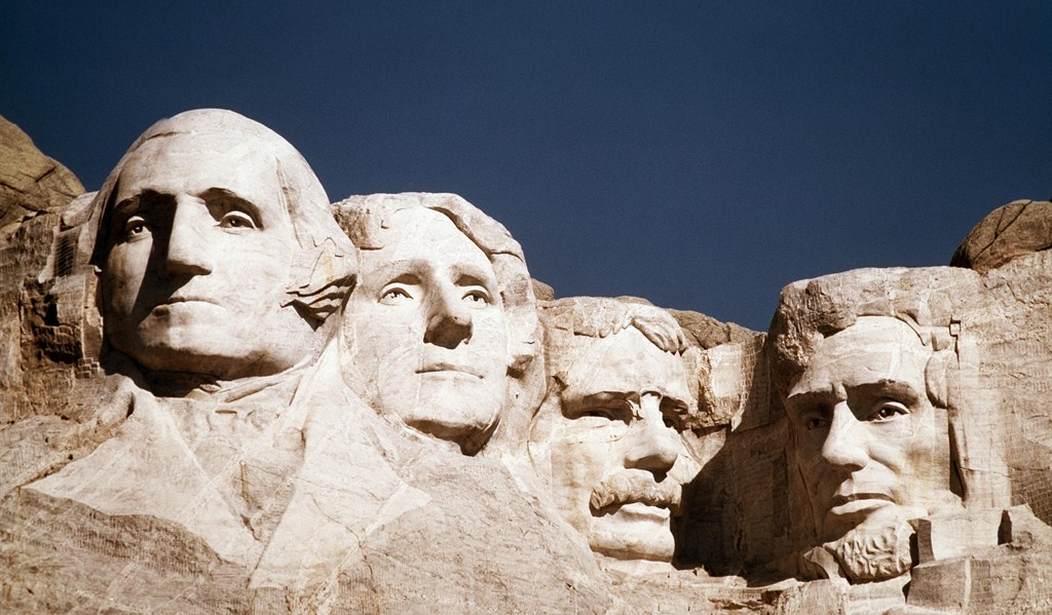In America, we stand on the shoulders of giants, enjoying the freedom that past generations fought and died for. And on this Presidents' Day, we remember and honor the greatest men to have held the highest office the USA can offer.
This holiday primarily celebrates George Washington, the Father of our country, and Abraham Lincoln, the man who saved our country. Washington’s (Feb. 22) and Lincoln’s (Feb. 12) birthdays used to be celebrated separately as holidays across most of the United States, but unfortunately, they lost their separate holidays in recent, more leftist, and less historically literate times. Every nation needs its heroes to admire and imitate, and today let us especially honor five of the most virtuous, visionary patriots to hold executive office: Washington, Lincoln, Ulysses S. Grant, Ronald Reagan, and John Quincy Adams.
George Washington was both the first and the greatest president. He had to set the precedent for every man to come afterward, and he had to steer the fledgling nation through its first rocky years of an entirely new form of government. And it is certainly not the least admirable of his actions that he surrendered power voluntarily after two terms, thus setting a precedent that only one overweening egotist has dared to challenge since.
As a general, Washington refused to lead a military coup and become king as he could have, and after being president, he willingly stepped down and returned to farming. He was indeed first in war, first in peace, first in the hearts of his countrymen.
“Still I hope I shall always possess firmness and virtue enough to maintain (what I consider the most enviable of all titles) the character of an honest man,” Washington told his longtime friend and ally Alexander Hamilton. There was no honor he coveted so much as integrity, and it showed in his actions.
Washington left us a great deal of valuable advice in his farewell address (most of which we have unfortunately ignored), including, “Of all the dispositions and habits which lead to political prosperity, religion, and morality are indispensable supports. In vain would that man claim the tribute of patriotism, who should labor to subvert these great pillars of human happiness, these firmest props of the duties of men and citizens.”
Second to Washington is Abraham Lincoln, the Great Emancipator, who accomplished the dream of Washington in which the latter did not succeed: ending slavery. Our founding principles could not logically exist simultaneously with slavery, we could not affirm the equality and liberty of all men while enslaving so many, and finally, the horrible contradiction and grave injustice was over.
If, Lincoln said soon before he was murdered for supporting civil rights, “God wills that it continue until all the wealth piled by the bondsman's two hundred and fifty years of unrequited toil shall be sunk and until every drop of blood drawn with the lash shall be paid by another drawn with the sword as was said three thousand years ago so still it must be said 'the judgments of the Lord are true and righteous altogether.'”For Our VIPs: Lincoln’s Warning Still Holds True for Dems Today
Like Washington, Lincoln was pious, patriotic, and principled. Unlike Washington, he did not get the chance to retire but was murdered by a crazed Confederate sympathizer. He left us as his legacy, however, a reunited and freer nation. So let us answer his call, as necessary today as when he made it first at Gettysburg in 1863:
It is rather for us to be here dedicated to the great task remaining before us – that from these honored dead we take increased devotion to that cause for which they gave the last full measure of devotion – that we here highly resolve that these dead shall not have died in vain – that this nation, under God, shall have a new birth of freedom – and that government of the people, by the people, for the people, shall not perish from the earth.
Grant comes after Lincoln, the man whom he called the “greatest I have ever known.” Grant carried on Lincoln’s legacy after the nightmare of racist Democrat Andrew Johnson and built his own lasting legacy too, for Grant was arguably the greatest civil rights president in American history. Falsely maligned and misrepresented as an incompetent drunk by his Democrat opponents, Grant was a brilliant general and a good president, most especially in working for fiscal responsibility and equal rights for all Americans.
Beloved of Native American Indian tribes whose rights he sought to guarantee in spite of his own government’s strong resistance, honored by the black Americans to whom he delivered his proudest accomplishment, the 15th Amendment, Grant said, “I have done all I could to advance the best interests of the citizens of our country, without regard to color.” He also warned, “I have never advocated war except as a means of peace, so seek peace, but prepare for war.”
Related: Ulysses S. Grant and Fighting for America
In conclusion, I would like to share quotes from Ronald Reagan, the man who brought morning to America and sunset to the Soviet Union, and John Quincy Adams, the “And he would have agreed with Ronald Reagan, who said, “Government's first duty is to protect the people, not run their lives.” And I think I could not do better than end this article with another Reagan quote: “Republicans believe every day is the Fourth of July, but the Democrats believe every day is April 15.” Happy Presidents' Day!










Join the conversation as a VIP Member